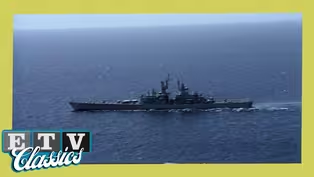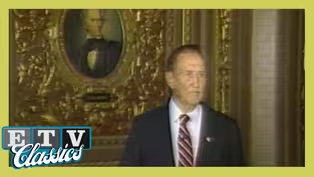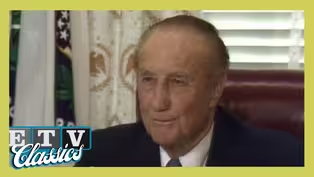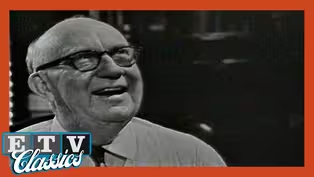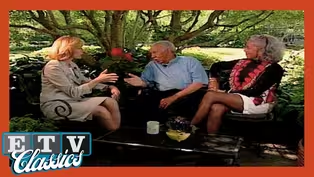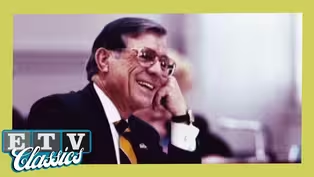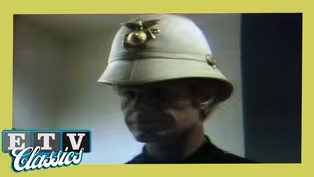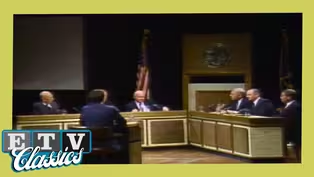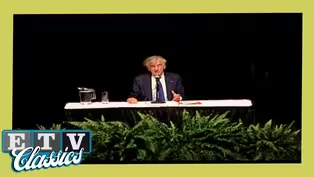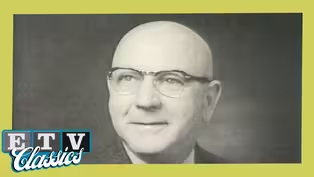ETV Classics
Senator Hollings on the Panama Canal Treaty | Seven30 (1977)
Season 15 Episode 10 | 28m 49sVideo has Closed Captions
Host Beryl Dakers interviews Senator Ernest F. Hollings about the Panama Canal Treaty.
In this program, recorded December 8, 1977, Senator Ernest F. Hollings discusses the Panama Canal Treaty that was, at the time, being debated in the Senate. The treaty was presented in 1967 but had been under study for the past ten years.
Problems playing video? | Closed Captioning Feedback
Problems playing video? | Closed Captioning Feedback
ETV Classics is a local public television program presented by SCETV
Support for this program is provided by The ETV Endowment of South Carolina.
ETV Classics
Senator Hollings on the Panama Canal Treaty | Seven30 (1977)
Season 15 Episode 10 | 28m 49sVideo has Closed Captions
In this program, recorded December 8, 1977, Senator Ernest F. Hollings discusses the Panama Canal Treaty that was, at the time, being debated in the Senate. The treaty was presented in 1967 but had been under study for the past ten years.
Problems playing video? | Closed Captioning Feedback
How to Watch ETV Classics
ETV Classics is available to stream on pbs.org and the free PBS App, available on iPhone, Apple TV, Android TV, Android smartphones, Amazon Fire TV, Amazon Fire Tablet, Roku, Samsung Smart TV, and Vizio.
Providing Support for PBS.org
Learn Moreabout PBS online sponsorshipMore from This Collection
Find classic news and public affairs programming from South Carolina ETV.
Open Line: Carolina to Shanxi (1980)
Video has Closed Captions
An exchange program for higher education between USC and the people of China's Shanxi Province. (28m 51s)
Charleston Place | Carolina Journal (1986)
Video has Closed Captions
This edition of "Carolina Journal" revisits the opening of the Charleston Place complex. (27m 20s)
U.S.S. South Carolina | Carolina Journal (1984)
Video has Closed Captions
Michael Collins goes aboard the missile cruiser U.S.S. South Carolina as it visits its namesake. (28m 54s)
Strom Thurmond Remembered (2003)
Video has Closed Captions
Charles Bierbauer reviews the life and accomplishments of South Carolina Senator Strom Thurmond. (1h 51m 22s)
Strom Thurmond At The Seat of Power (1982)
Video has Closed Captions
The documentary follows the life and career of Strom Thurmond. (29m 49s)
Profile: The Senator from Barnwell: Edgar A. Brown (1967)
Video has Closed Captions
A visit with the venerable Edgar A. Brown in his law office, home, and the streets of his hometown. (14m 42s)
A Conversation with Justice Ernest Finney, Jr.: A Lifetime of Success (2000)
Video has Closed Captions
The honorable Judge Ernest A. Finney, Jr. discusses his life, career, and legacy in SC's lawfare. (27m 47s)
Profile: Senator John Drummond of Ninety-Six | The Big Picture (2008)
Video has Closed Captions
The life and times of Senator John Drummond of Greenwood, South Carolina. (26m 53s)
Video has Closed Captions
The memoirs of three businessmen who attribute their successes to their time in the US Marine Corps. (28m 54s)
The Governors' Roundtable | Carolina Journal (1989)
Video has Closed Captions
A round-table discussion with nine men who served as governor of the state of South Carolina. (57m 54s)
Elie Wiesel | Solomon Tenenbaum Lectureship in Jewish Studies (2006)
Video has Closed Captions
Professor Elie Wiesel, first Nobel laureate delivers a lecture as a part of the Tenenbaum series. (1h 17m 18s)
Solomon Blatt: Speaker Emeritus of the SC House | Carolina Journal (1985)
Video has Closed Captions
The life and career of Solomon Blatt, Speaker Emeritus of the S.C. House of Representatives. (27m 49s)
Providing Support for PBS.org
Learn Moreabout PBS online sponsorship♪ ♪ ♪ Beryl Dakers> Good evening and w Our guest tonight, the honorable Senator Ernest F. Hollings... Democrat, South Carolina.
Senator, it's nice to have you with us.
Sen. Hollings> It's nice to be with you again.
Beryl> You've been identified as perhaps one of the leading proponents of the new Panama Canal Treaty.
Let's begin with that...why?
Sen. Ernest Hollings> I think-- on one hand, I am a member of the Commerce Committee.
A new treaty was presented in 1967.
President Johnson promised it, and former Secretary of the Navy, Bob Anderson, came before our committee at that particular time.
More recently, in August of this year, I led a group of senators down to the Panama Canal in the Canal Zone itself.
It's been a ten-year study for me, having led the group and having to report.
In essence, I took a position.
Beryl> Senator, it seems that, somehow, in the current discussions we are lacking some of the historical backing behind this renegotiation of the treaty.
What provided the original impetus for coming up with the new treaty?
Sen. Hollings> You're dead on target with respect to the need for a new treaty because it has been historical in a developing situation, and we have led the development, you know I guess at the turn of the century and everything else of that kind our power was all vested in military might, but the only real power that America has now, and the moral force of its position, and since World War II and Korea and Vietnam, we have sponsored self-determination, anti-colonialism.
We got rid of the Philippines, we returned, for example Okinawa.
We paid way more to obtain Okinawa--10,000 lives-- than we ever paid to obtain the Panama Canal, but we gave that back to an enemy-- former enemy, Japan-- rather than our always friend, the Republic of Panama.
Having 25 years now evolved and led the way, and even with the Suez Canal, when Egypt commandeered, nationalized the Suez Canal, we took the part of Egypt rather than England and France, back 20 years ago.
So now, here in 1977, we have Jimmy Carter being inaugurated in January and these Latin presidents setting back a day extra in visiting with him, eleven.
They came into the White House and said, "President Carter, "President Lyndon Johnson promised, "but he got bogged down in Vietnam "and couldn't deliver.
"President Nixon got bogged down in Watergate.
"President Ford promised, but he just didn't have time.
"Now, we've been negotiating for 12 years.
"When are we going to get our sovereignty and control of our own country?
", the very thing that America stands for.
Of course Carter said, "Well, we'll do something.
We'll do our best and see."
The new thing that's been injected in a historical way that was not offered in 1967 is the Pentagon really came into the act for the first time and sponsored what we call Article Five of the Second Treaty, guaranteeing in perpetuity the right militarily to go in and keep that canal open for free access to all the nations of the world.
We also got a section in Article-- that was Four-- Article Five, that says no persons of a nationality other than the Republic of Panama can operate that canal or defend it.
You can't get any Castro troops in from Cuba.
After those things were developed, now the treaty has been presented.
It's really been an historical development where we not only built a country, we built a people.
They've got patriotism... the fundamental to the American character.
Like you and I are proud of our country, they're proud of their country.
Their pride is on self- determination and self-destiny.
Our pride in the Panama Canal zone issue has been on ownership of foreign territory.
We just can't live that way anymore-- Beryl> Colonialism.
Sen. Hollings> Colonialism, and that's exactly what is an issue here.
Beryl> Were you suggesting earlier, then, that in saying that we have led the way, that our response to the cries of anti-colonialism were self-motivated rather than reactive?
Sen. Hollings> Well, that's right.
It's been self-- certainly with respect to human rights.
I think, under Henry Kissinger, my regret and frustration all the time... you never knew what the foreign policy was.
It was carried around in Henry's back pocket, and it was CIA, secret super duper.
That's why I like the initiative in the Middle East so much, directly between Israel and Egypt.
Now, with President Carter, it's open, aboveboard, for human rights.
This is what America's been an inspiration.
Year ago, Adlai Stevenson said, "When man had few rights anywher "the Declaration of Independence proclaimed the rights of men everywhere."
He said, "As those words went ringing around the world, "men with their eyes cast down and their backs bent "cupped their ears and listened and bit by bit straightened their backs."
He says, "It's 200 years ago we were the hope of all the world's oppressed."
Today, that's the American inspiration, that's the moral force of our position.
If we're going to have human rights, we've got to have human rights in the republic of Panama.
Beryl> Yet this very issue is one that has brought the Carter administration into some severe criticism, the idea of a fluctuating human rights policy... applicable in some cases and not in others.
Sen. Hollings> You can't make th and you can't make it over in your own image.
Certainly, it's going to be for the interest of the United States, working...
They talk about a dictator, for example, in Panama.
Let's talk about the dictator Park.
We created South Korea, and that's our dictator we put there.
Nobody's saying get rid of President Park.
If we got rid of him, he would turn it over to communism.
How are you to foster human rights?
It's not a clear choice.
We're trying to impose constitutional principles and civil rights and those kind of things in the Republic of South Korea.
We're trying to do the same in the Republic of Panama.
One of the best ways we can do it is get rid of the vestiges of colonialism, let them attain their own sovereignty, let us give them the defense guarantee, because militarily, talk about blackmail they don't have an army big as the South Carolina National Guard, certainly not as well equipped.
They have no Navy, no Air Force... they haven't really threatened us.
This is what the latin president They could get the sovereignty back, eliminate the nationalism issue from the communists-- from Castro people taking over down there-- and at the same time be given that military guarantee by the only power strong enough in the Western hemisphere to defend... namely, the United States.
Beryl> Senator, can we actually on a country, without... in the same breath-- Sen. Hollings> It's got to come from within.
I guess we spent 56,000 lives in Vietnam trying to impose freedom from without.
Now, there's the difference.
That's the lesson of Vietnam.
People don't like foreigners in their country.
The North Vietnamese, I don't li the Vietcong... they had a good enough love of country to come straggling through in black pajamas, and they didn't have any navy, and they didn't have any B-52 bombers, but they kept coming and coming and coming.
There we were with flamethrowers and napalms and B-52 flights and the Navy up there and aircraft carriers and everything else, but we couldn't get the people to fight as hard, as determinately, and as courage in South Vietnam as they did in North Vietnam.
We had the equipment.
We had the best fighters in the American soldiers but to "Vietnamise" and get them to take over on their own-- we spoiled them, and they just didn't fight as hard.
As a result, we had to withdraw.
Beryl> What assurance do we have, then, that the majority of Panamanians, indeed, favor this particular treaty?
We keep getting mixed press reports.
There's a mixed reaction within that country, as well.
Sen. Hollings> You're going to a You get a mixed reaction right h But the truth of the matter is, they had a free election on October 23rd.
Torrijos said, at that particular time, "I want UN observers.
"I want observers from the colleges and universities and American free press to come in."
They all went down, and it was a totally free election.
Senator Bob Byrd, our majority leader, had just returned this week from Panama.
He said he was amazed.
He'd heard about this dictator, and everything else of that kind so he went around in crowds.
Torrijos, at one time, did have a pistol on him, but he threw it away when one of the senators commented.
And he shoved through crowds and went amongst the people.
and everything else Now, with political prisoners, and a real dictator, they had to wipe him out and got rid of him quick, running around with senators around the streets.
He is a dictator-- don't misunderstand-- but in that sense, a popular dictator.
This is the issue that all the people are joined on namely, their own right of self-destiny and their own sovereignty in the republic of Panama.
Beryl> You're saying there is no dispute-- Sen. Hollings> There's no dispute on that.
Just don't give it to the communists.
The communists were the only ones down there objecting to it when I was there in August They were absolutely opposed, because they would lose their issues.
That's where in Vietnam we didn't have that nationalism issue.
We couldn't engender it.
As you say, we couldn't impose democracy on those people.
By gosh, that commie crowd sure did.
Beryl>Why then, do we hear about this huge communist presence and its influence in Panama among those who are critical of the treaty?
Sen. Hollings> That's a total misconception and an absolutely distorted picture.
Let me put it this way... neither the United States nor Russia are in control, or the Marxists or the communist but if anybody's in control-- I'm going to cite a few things to give you a picture-- it's the United States' influence there.
I say, we not only built the can We were their police force until 1936.
We actually took over in the Chiriquí province, the island of Tobago, not just the canal and everything else.
We had big old, ugly American We did anything we wanted to down there.
They had separate drinking fountains like we had in the South right up at the end of the '40s and early '50s.
We had segregation, and then we had it with our own people taking over and segregating the nationality, namely the Panamanians.
Now what we've done is come with private free enterprise and constructed the country in our own image with a president, a congress, and a business community.
We trained their national guard.
Torrijos himself was a major in the national guard, trained at Fort Sherman, and they've had 750 university and college graduates within the United States from the Republic of Panama on average every year.
Lakas, the president, went to Wesleyan College and Texas Tech.
He spent six years in Texas.
Nicholas Barletto, the economic minister, is a graduate of N.C. State.
He roomed next to Governor Hunt when Governor Hunt was a student there and then studied under Milton Friedman in Chicago, the University of Chicago, and so the Friedman economics.
You've got 17 U.S. banks.
There are 80 free world banks down there.
It's a private, free-enterprise enclave, and the Soviet doesn't even have an embassy.
A major general retired here in the city of Columbia categorically gets up and says, "I spent three tours in Panama.
"I know what I'm talking about, and the biggest embassy down there is the Soviet embassy."
The Republic of Panama has never recognized a Soviet Union!
There's no ambassador from Panama to Moscow and no ambassador from Moscow to Panama.
You get these things about a Marxist-controlled country-- that's what it would be if we turn these treaties down.
They'd come in like they did in Vietnam and other places, take over the nationalism... "See the gringos, see the powerful United States.
"They're trying to back us into imperialism, take your country over.
The only way you're going to get freedom...." they'd talk to students, the stu and they'd lead the way with Torrijos I think, against all of us.
Beryl> What, then, accounts for we are seeing against ratification of the treaty, if these arguments don't hold water?
Sen. Hollings> In context, let's call it frontlash.
Beryl> All right.
Sen. Hollings> The reason I call it a frontlash is because they started before you could even get a treaty.
The American Conservative Union-- and I'll now say the Republican Party.
It's a political issue with them.
Why?
Because, I got a letter, not only from Governor Reagan, but Bill Brock, the national chairman of the Republican Party sends me a, a jointly signed letter.
and at their Republican policy m they took an official position against these treaties.
They think they got a good political issue going, You've got the Committee for an Effective Congress, another group, and they've got a direct mailer and everything else, it's 13 miles down the road out of Washington, D.C.
They all organized and even star in the United States Senate with a committee on the Separation of Powers, Constitutional Subcommittee for You know what they did?
They had hearings in June.
We didn't even effectuate the treaty until August.
They started, that's why I call with hearings in June and bringing in admirals and others to oppose the treaty and started their onslaught in August.
The time they consummated that treaty in August, they'd already had letters grinding and everything else, and people became alarmed.
They said, "Heavens above, what's gone wrong with that crazy Congress and Carter administration?"
and everything else like that?
They just couldn't understand the giveaway.
Beryl> Are you saying that it's primarily Sen. Hollings> And charging... Beryl> a psychological issue then, for us, as opposed to a reality?
Sen. Hollings> It's a misstatement of facts.
It's a misstatement of history.
It's a misstatement of the principles and the hopes and aspirations of us as a nation.
It's a disgrace.
And the truth of the matter is, after I'd listened to it all, and found out, legally, I'd written a newsletter.
Last yeah we didn't have the sov and now I know we don't want it.
And now, having gone there and visited and talked, and everything else and trying to determine what's for the best interest of my country-- Talk, I can quote so many-- Admiral Holloway, he's chief of naval operations.
He's born on Sullivans Island in Charleston.
He's an Annapolis man and a hero, an aircraft carrier pilot.
He knows defense, and he's 100% for these treaties being in the best interest of the country, and all the joint chiefs are.
And the past, four-star General O'Meara and General Porter, who were the southern commanders down there, historically, say this is in the best interest of our country, where we've got permanent neutrality, a right militarily to go in, and the only way we can maintain security is to have a friendly people.
If we turn the canal down, if we keep this 10-mile strip of separate courts and ugly Americanism, as I call it, and everything else of that kind They got two Panamanians... the good jobs and the shipboard captains.
They get paid more than the operator of this TV station or almost any So they've got the plush jobs, and everything else and we've got to cut that out and say, "Let's go in with the new treaty."
How are we going to pay for all these bases and everything we got down there?
We're not paying, for them to take it.
That's another misnomer to truth is they increase the tolls.
We do pay in Greece, We do pay in Spain.
That's taxpayers that have to pay for those bases.
Let's look at Greece.
In Greece we pay $700 million over a four-year period, or $175 million a year.
Beryl> Have we-- We're paying $70 million in Panama-- Beryl> Have we any security, though, that by increasing the tolls we will not in effect, be turning away some of the traffic?
There is a discussion that the canal is, for many, obsolete.
Sen. Hollings> It is...they turn When you turn away the mother ship, all the support vessels, the des they can't go through the canal and send the aircraft carrier by itself around the horn, They got to keep with that...the Take the supercarriers bringing oil... you can't get and supercarriers from Alaska to the East Coast.
So, what we really want to try to do is get a sea level canal.
It could well be by the year 2000, all of this will be moot.
For the simple reason, that we know now, from an inter-oceanic canal study report in 1970, that the only feasible routes, this a quote, "the only feasible routes, are 10 and 14 in the Republic of Panama."
Now, there's another little issue there.
They say, we contracted and woul but in Panama."
That was something we asked for.
We didn't want Panama to negotiate with anybody else.
They said, "We want that same binder on you."
We said we're glad to do it, because we've studied.
And Nicaragua we had, under William Jennings Bryan-- we had a former congressman, William Jennings Bryan Dorn.
We got to give him a little part William Jennings Bryan was Secre He got us a treaty in perpetuity to build a sea level canal through Nicaragua.
We found by 1970 that it was an irritant.
They don't want any foreign ownership in their country, either.
So they said it was an irritant... "Can't we do away and repeal that treaty?"
So they came back up, and in 1971, 6 years ago, by a vote of 66 to 5, Senator Dole voted to do away with that treaty.
Now Senator Dole is on the senate floor saying we ought to go through Nicaragua.
Why did we do it?
They haven't even remembered that we did that affirmatively.
We only want to build a canal, sea level route, either through 10 or through Route 14 in the Republic of Panama.
Nicaragua would displace 370,000 people back in '70, cost $11 billion, and they have earthquakes.
We don't have any earthquakes in the Republic of Panama.
Beryl> Senator, what guarantee do we have, then, that the political government in Panama is today stable enough to make this treaty not a moot question?
Sen. Hollings> No one can guarantee that.
I don't...I want to contend that I can.
We know it's been stable under Torrijos since he took over in 1968.
Beryl> That's less than ten years ago.
>> That's right, and that's longer than Richard Nixon.
He had to leave almost in impeachment...
I don't think, compare the stability of the United States with-- Beryl> But the government as opposed to the leadership-- Sen. Hollings> I know one way to destabilize, stabilize it on the wrong side, That is turn these treaties down.
They'll get some real dictatorial government that will come in there and they'll nationalize it.
Who'll be with us?
Under the new treaties, we've got all the Latin countries plus the republic of Panama pledged to it.
Under no treaty at all, they could call in Castro and start lobbing shells into the Zone.
We only pay them 2.8 million.
Beryl> Let's talk about the nati of the canal.
Specifically, what are those aspects for us as Americans?
Sen. Hollings> We phase out our different bases.
We've got some 14 bases there no jungle warfare school and everything else of that kind.
They're rather small ones, but they've been important to us.
We phase those out over the 23-year period until the year 2000, and then we've got the real authority under the treaty to defend the canal.
You don't wait until something comes in like the Navy.
There's no real navy in the Panama Canal Zone.
There's a captain as the highest rank, and 600 communication people and everything else like that.
If I'm chief of naval operations, I'll meet any navy on either side 2 and 3 hundred miles before they get to the Panama Canal, or the Air Force is going to meet them before they can get there.
So other than the internal security, we need none right down there.
We've got the rights we need if there's any jeopardy to that canal after 2000 under the treaty.
Beryl> The other question that seems important is, how vital is the canal itself to the economy, the health, of Panama?
Sen. Hollings> I think it's vita it is Panama.
It's vital to our economy and health.
I've never contended otherwise.
It's only about the last-- the most up-to-date figures were out yesterday afternoon.
said in Washington, 12% of the international trade of the United States goes through.
Somebody says it's less than 10% is the State Department figure.
Let's use the 10% figure.
The fact is, even that 10% is fundamentally important to a lot of things still going through, so I don't want to try to say I'm doing it because it is obsolete.
We cannot get the other things.
Now, Panama... we not only have the canal, which is its backbone, its economy, but we've got the two deepwater harbors at Cristobal and Balboa.
And here, we've gotten those in the Zone, and we take our, not only the canal, but the economy, the total econo in this Zone, so this is the most important thing.
This has held the country back.
We hold them back.
Some opponents say, "Oh, we treated them good.
They've got a per capita income.
We paid the country of France for the rights more than we paid the republic o Beryl> Some of the opponents also say, "All right, fine, we need to renegotiate a treaty, "but let's do one that still allows us some lease in perpetuity."
What, from your seat, would be the effect of that type-- Sen. Hollings> They don't unders no kind of lease in perpetuity in anybody's land in this day and world.
When Charles de Gaulle under our NATO treaty, where we had leases for bases in France, said, "Get out," we got out.
We didn't have any argument because he's big enough to really make trouble with us.
When the Egyptians said, "Get out of our canal," they got out.
As each country comes and attain and says, "Get out," the foreigners are going to have to leave.
That's fundamental to the American way.
That Declaration of Independence is that shot, went ringing around the world.
Beryl> The American way for Americans, but not necessarily for-- >> It's for everybody...that's why we're trying to extend it and we're proud to extend it on that particular basis.
Beryl> Senator, what is the likelihood that this treaty will not be ratified?
Sen. Hollings> Well, as time goe all the polls show that everybod 60% approved, and it's on the increase.
The momentum, the direction, the approval is coming our way.
I would say as of tonight, Nope.
It wouldn't get the two-third vo but not the two-thirds necessary I would hope after the Armed Services Committee has hearings, after the Foreign Relations Committee completes its hearings in January, after the various members who have scheduled trips in January come back and what have you, and the public learns and knows, and you're going to have a good debate, I understand, on January the 13th with Governor Ronald Reagan and William Buckley on public broadcast I think the people will learn and make their own judgment.
I think we'll pick up the necessary two-thirds vote by I would say, sometime in late February.
We'll vote at that time or early March, I hope.
Beryl> It seems that this entire discussion centers around changing an Ameri to our modern-day existence in the world.
Are you suggesting that by pulling away from our colonial vestiges that we are, perhaps, not taking a backseat in world affairs but-- allowing that we are not- Sen. Hollings> We're taking a front seat in human rights, in the greatness of America.
If we can't stand for that, we can't stand for anything as Americans.
That's our...we never have, when we took the Philippines-- when we freed Cuba, we gave Cuba back.
We never have wanted to be imperialistic, or exact our way of life, tell or control anybody's land.
It was a good thing at the turn of the century.
The Panama Canal has worked extremely well for Panama and for the United States, but now, as we work with this friendly country-- the people there are friendly to the United States.
They're not hostile or Marxist-controlled... pure nonsense.
As we work with them, here's a g and procedure that's been worked out by our joint chiefs, particularly for a 23-year period in an orderly way to turn it over.
We don't know whether Torrijos will be there in 2000 or I'll be here or President Carter, or any of us will be living but this is a good way for a mature, leading free nation, like the United States of America, the hope of the free world, to conduct itself in this particular affair.
Beryl> In this leadership role c this type of attitude carried out in our relations with other countries?
Could we expect, then, a lessening of influence in countries in South Africa or among emerging African nations?
Sen. Hollings> I think we increa I think by the end of the Nixon administration, we had zero influence in Africa.
We were on the wrong side.
They tried to get us in on the wrong side in Angola, and some of these same folks are arguing about Angola.
We don't have time to get into Angola, but I can tell you right now, that we're putting us in on the wrong side and that was a In any event, now under President Carter, under Ambassador Andrew Young, we're putting that same foot forward.
Some people are irritated by it.
You can't go around and tell others how to live.
We're not doing that.
We're saying with respect to people determining their own destiny, the majority rules, and the people are going to have to vote and everything else You can't take, in an almost totally Black country, a White minority control in Rhodesia or South Africa.
We believe in everybody's civil rights, the right to vote and express themselves and determine their own destiny.
If we can't stand for that in the United States, we can't stand for it in South Africa.
If we do, we must stand for that in Egypt and in Israel and in South Africa and in Mozambique.
That's why you see the Soviet being invited out of Somalia.
That's why you see the Soviets losing in Egypt.
I think we're beginning, under President Carter, to pick up strength around the world, because we couldn't explain our policy under Foster Dulles and couldn't explain our policy We're beginning to explain it now and openly explain it and get adherence to it and support for it and respect for it the world around.
Beryl> Senator, we only have abo I wanted to ask you something that's very dear to those of us who work in public broadcasting.
Because of your position on the Commerce Committee, right now, at a time when our ve what are your hopes for the future of public broadcasting in this country?
Sen. Hollings> Continued success, expansion, more financing, help, and everything else from the federal government.
I don't want to eliminate the private participation because I want Henry Cauthen running the programs, not Fritz Hollings running them.
The leader and manager of this station is a national leader.
We're going to follow his leadership and others in public broadcasting, improve the worth-- I mean acceptance, now-- in the audience ratings, and everything else has now improved itself.
We just don't want to build up a big bureaucracy, and we don't want to have censorship.
You're not going to build up a fourth network band.
We can't go into the billions, but we can certainly give it greater financial support.
Beryl> Senator, is it possible for us to gain continued governmental funding and things of these sorts without also gaining undue influence in the programming?
Sen. Hollings> Nope...no one.
Th during the Nixon administration.
You remember, they were trying to hold up the budget because they were trying to take Bill Buckley off or Bill Moyers off.
We fought that in the congressional side in the Capitol there.
We withheld, I don't think you've got that influence out of the White House.
and you certainly don't have it in Congress.
We're not trying to tell them how to program.
Beryl>Senator, thank you so much for being with us tonight.
Sen. Hollings> Thank you very much Beryl> And thank you for watching this edition of "Seven Thirty."
I'm Beryl Dakers saying, Do have a pleasant evening.
♪ ♪ ♪ ♪
Support for PBS provided by:
ETV Classics is a local public television program presented by SCETV
Support for this program is provided by The ETV Endowment of South Carolina.


